
"Lost in Love" is a song recorded by the British/Australian soft rock duo Air Supply. The song was written by group member Graham Russell. The original version of the song appeared on the Life Support album in 1979 and was released as a single in Australia, reaching number 13 on the Kent Music Report. The group re-recorded the song for the album of the same name in 1980 and this version was released as a single in the US, reaching number 3 on the Billboard Hot 100.
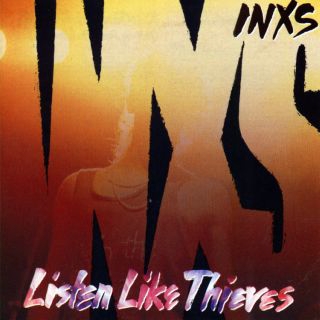
Listen Like Thieves is the fifth studio album by Australian rock band INXS. It was released on 14 October 1985. It spent two weeks at number one on the Australian Kent Music Report Albums Chart. Considered an international breakthrough album for the band, it peaked at No. 11 on the United States Billboard 200, No. 24 on the Canadian RPM 100 Albums and in the top 50 in the United Kingdom.

"Computer Games" is a song by New Zealand band Mi-Sex, released in September 1979 in Australia and New Zealand as the second single from their debut studio album, Graffiti Crimes (1979). The song peaked at number 1 in Australia and 5 in New Zealand. The music video was filmed on location at what was at the time Control Data Corporation's North Sydney centre and included gameplay from the 1979 arcade games Speed Freak, Basketball and Star Fire. The single won the award for Best Australian Single at the 1979 TV Week/Countdown Music Awards.
Stephen Ellis Gilpin was a New Zealand singer and a founder of new wave band Mi-Sex.

Mi-Sex is a New Zealand new wave band originally active from 1978 to 1986, and led for much of its existence by Steve Gilpin as vocalist, Kevin Stanton as guitarist and songwriter, Murray Burns as keyboardist and songwriter, and Don Martin as bassist. The group's manager for much of its career was Bob Yates. Mi-Sex achieved two top 10 hit singles in 1979-80: "Computer Games" in October 1979 and "People" in 1980. Their first two albums both reached the New Zealand top 10, Graffiti Crimes and Space Race. They were known for their cutting edge production and dynamic live shows. Gilpin died in January 1992, two months after a serious car accident from which he never recovered. Mi-Sex have periodically reformed, including in 2011 with Steve Balbi (ex-Noiseworks) on lead vocals. Stanton died on 17 May 2017, Martin on 10 August 2020.

The discography of American rock band Tool consists of five studio albums, one box set, two extended plays, four video albums, fifteen singles and nine music videos.
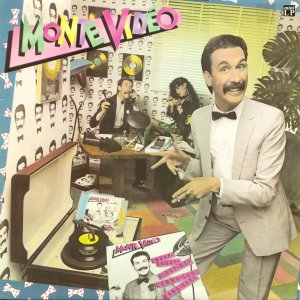
"Shoop Shoop Diddy Wop Cumma Cumma Wang Dang" is a song by New Zealand band Monte Video and the Cassettes. It was released as the band's debut single in 1982 and reached number three on the New Zealand RIANZ Singles Chart, as well as number 11 on the Australian Kent Music Report. The track appears on Monte Video's 1983 self-titled mini-album and was later released in the United Kingdom and United States.

"Montego Bay" is a song co-written and performed by Bobby Bloom about the city in Jamaica of the same name. The song was a top ten hit for Bloom in the Fall of 1970 on both sides of the Atlantic. It reached No. 3 on the UK Singles Chart, No. 5 on the Canadian RPM 100 Singles Chart, No. 7 on the Australian Go-Set Singles Chart and No. 8 on the US Billboard Hot 100. The song was co-written and produced by Jeff Barry. In the master tape of the song, Bloom breaks into a chorus of "Oh, What a Beautiful Mornin'" at the end of the recording. The song features a whistler, as well as Jamaican instruments in a calypso style.

The discography of Dead or Alive, a British dance-pop group, consists of six studio albums, seven compilation albums, twenty eight singles, and two video albums.

The discography of British-American band Fleetwood Mac consists of 18 studio albums, 10 live albums, 23 compilation albums, one extended play and 62 singles. The band also has sold over 120 million records worldwide, making them one of the best-selling music artists of all time.
This is a complete discography listing for Split Enz, a New Zealand-originated experimental rock-pop group. Their creative output includes several albums, singles, music videos, compilations as well as having albums pay tribute by other artists.
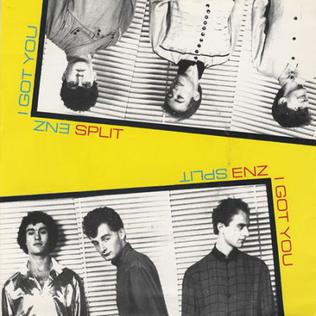
"I Got You" is a song by New Zealand rock band Split Enz. It was released as a single on 21 January 1980 by Mushroom Records in Australia and New Zealand, and August 1980 by A&M internationally, as the first single from their breakthrough album True Colours. Written by co-lead singer Neil Finn, who did not initially believe it to be a hit, it became the band's most commercially successful song, topping the charts in Australasia and placing in the top 20 of the British and Canadian charts. By July 1980, it had become the biggest selling single in Australian history.

Space Race is the second studio album by New Zealand New Wave music group Mi-Sex, released in May 1980.The album peaked at number one on the New Zealand albums chart and was certified platinum.

Graffiti Crimes was the debut studio album by New Zealand new wave music group Mi-Sex, released in July 1979. The album peaked at number six on the New Zealand albums chart and number 16 on the Australian Kent Music Report. the album was certified Gold in New Zealand.

"I Send a Message" was the second single released by Australian rock band INXS from their fourth album The Swing. The music video was directed by Yamamoto San and filmed in Tokyo at the city's oldest Buddhist temple in Main Old City Park.
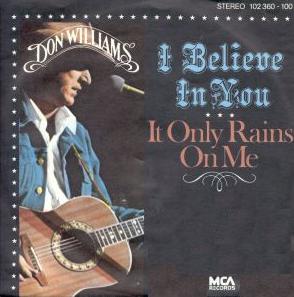
"I Believe in You" is a song written by Roger Cook and Sam Hogin, and recorded by American country music artist Don Williams. It was released in August 1980 as the first single and title track from the album I Believe in You.
Something's Missing (In My Life)" is a song composed by Paul Jabara and Jay Asher, and recorded by various artists. The song was recorded as a duet with Jabara and Donna Summer in 1978, and appeared on Jabara's album Keeping Time.
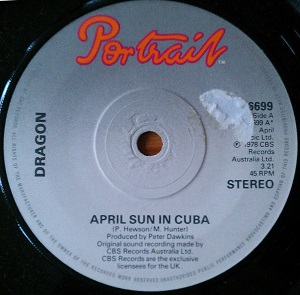
"April Sun in Cuba" is a song recorded by New Zealand group Dragon, released in October 1977. It is the first single to be released from Dragon's fourth studio album Running Free. "April Sun in Cuba" first charted on 7 November 1977, peaking at number 2 on the Kent Music Report Singles Chart and staying on the chart for 22 weeks. It also reached number 9 on the New Zealand singles chart. The b-side of the single, a non-album track called "Telephone", was credited to "Dr. Agony".
"But You Don't Care" is a song by New Zealand group Mi-Sex, released in June 1979 as the lead single from their debut studio album, Graffiti Crimes (1979). The song was the band's first on CBS records and became the band's first charting single, peaking at number 33 in New Zealand and 25 in Australia.
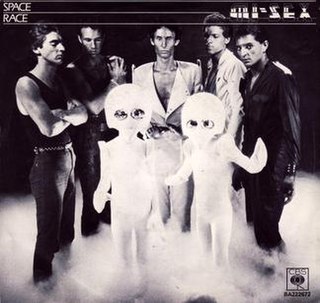
"Space Race" is a song by New Zealand group Mi-Sex, released in June 1980 as the second single from their second studio album, Space Race (1980). The song peaked at number 19 in New Zealand and 28 in Australia.
















